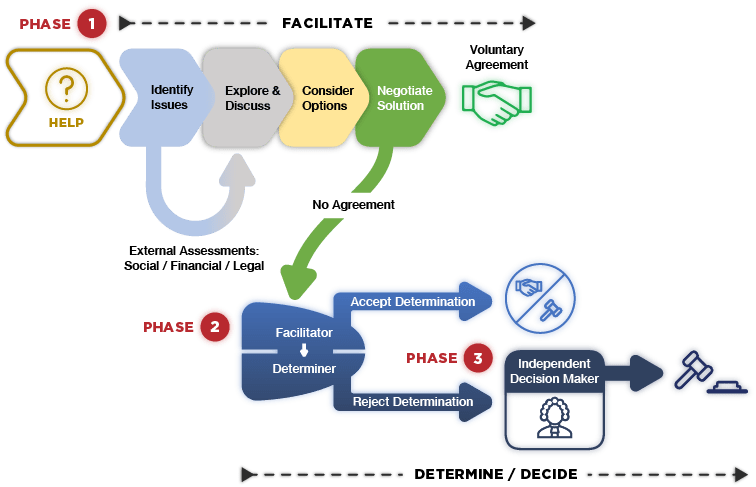Disagreements strengthen relationships; Disputes destroy them
SODR (Solution-Oriented Dispute Resolution) – For Families
Key Features and Benefits
- Confidential, practical, (relatively) quick, flexible, human-centric and family-sensitive.
- Extremely time-efficient and cost-effective.
- Guaranteed outcomes. Individuals can’t block, or hold the process, hostage.
- Better, safer and less damaging than doing nothing, or litigating.
- Addresses underlying issues, repairs relationship damage, resolves conflicts, restores respect and trust, and re-establishes hope for a better future.
- Actionable results: written Agreement, Determination, or Decision – enforceable at law, and/or under Family Rules.
- Closure for individuals, the family, and the business.
- Using a “disposable” Dispute Resolver saves family members from getting burnt through their efforts to restore the peace!
SODR for Families – Process Contract
To view a standard SODR Process Contract, click here.
SODR Process
Phases: (1) Facilitation >> (2) Determination >> (3) Independent Decision
Phase (1) Facilitation
Facilitator guides family conversations towards a Negotiated Agreement, and provides individuals with personalised support, as required. Resolves most disputes.
Phase (2) Determination
If conversations and negotiations don’t produce a voluntary Agreement, the Facilitator makes a written Determination, based on their understanding and appreciation of the Individuals, the Family, the Business, and the Issues. Resolves most remaining disputes.
When signing the Process Contract the family chooses the level of authority and practical effect it wants to give to the Facilitator’s Determination. They have 3 options:
(A) Advisory, or
(B) Enforceable under Family Rules (pre-determined practical consequences), or
(C) Enforceable at Law, as a contractual agreement (legal consequences).
Original choices can be changed within the process, by unanimous agreement, at any time. Otherwise, what was agreed at the start of the Process works its way through to the conclusion.
Although seldom needed, this is a useful resource – sometimes a family just wants a credible, neutral person to make decisions for them, to bring their broad conflict, or their fight over specific issues, to an end.
Phase (3) Independent Decision
In the very rare situations where all Parties agree to reject the Determination, the dispute is referred to a neutral, Independent Decision Maker (“IDM”) for a Decision. Resolves what’s left!
The IDM is either: (a) an individual nominated at commencement, or (b) an accredited adviser selected by TSG.
The IDM decides how best to proceed, after separate or joint briefings by the Facilitator / Determiner, and by the family (presenting as a group).
Under the terms of the Process Contract, The IDM’s Decision is either:
(A) Advisory, or
(B) Enforceable under Family Rules (pre-determined practical consequences), or
(C) Enforceable at Law, as a contractual agreement (legal consequences).
The IDM option provides the ultimate safety net for families who want to be certain that their issues will be resolved, once and for all.

